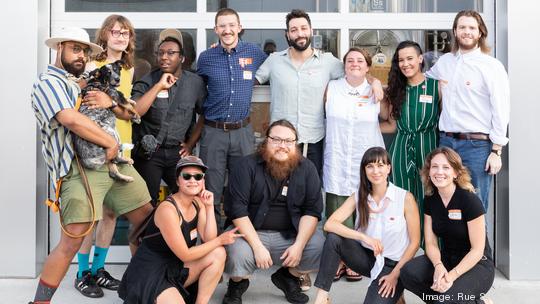
A few weeks ago, we profiled the first five companies in the 2021 Providence Design Catalyst program run by the non-profit DESIGNxRI, an organization that seeks to encourage and promote opportunities for designers, design businesses, and the design sector in the Ocean State. The program provides each business with mentorship, business training, and up to $15,000 in grant funding. Today, we take a look at the remaining five businesses from the cohort and look further into the unique design sector in the Ocean State’s startup ecosystem. Without further ado:
The Design Studio for Culture + Planning
Shey Rivera Ríos created The Design Studio for Culture + Planning to focus on social justice for creative economies and urban planning. The company offers consulting services for cities and municipalities in regards to cultural planning, creative industries, cultural policy, and equity in community development. The company also can help artists and artistic organizations manage their business and develop a strategic vision. During the Providence Design Catalyst program, Ríos acquired new space, grew the brand, and purchased new equipment.
Ríos said the grant funds made a huge difference in upgrading the company’s capacity and scale. Over the next year, Ríos’ goal is to continue growing the brand and hire employees.
We Time Audio House
Launched by Garrett Crosby, We Time Audio House is a platform that specializes in helping bring podcasts and other sound projects to life. Crosby believes the company sets itself apart with its scale, background, experiences, and approach. During the program, Crosby worked on growing the brand and also purchased new equipment, which has enabled the business to pursue sound design jobs that it would not have otherwise been able to take on.
“Working alongside my mentor, I implemented new marketing approaches for my business. I plan on continuing to refine the niche I operate within, which will help me get paid more for value delivered than time spent,” he said.
In 2022, Crosby hopes to generate 25% more revenue than he did in 2021. Crosby also hopes to further research the possibility of getting a studio outside his home and bringing on freelance help when needed.
Anyhow Studio
Anyhow Studio is a community ceramics studio that teaches classes and targets students at a specific time in their artistic development to offer services that other studios do not. During the program, Founder Elizabeth Welch implemented a social media schedule and hired a bookkeeper to better get the company’s finances in order. She also extended Anyhow Studio’s brand, hired an intern, and purchased new equipment.
“I think a culminating event for me that really highlights what this program has done for me and my business is pitching Anyhow at the final showcase,” Welch said. “I came into the grant program with a lot of ideas, but no details; when I reflect back on how succinctly I was able to describe the community need, how I'm going to achieve it, even how I chose a name, it underscores how much I have accomplished in five very short months."
Over the next year, Welch’s goal is to hire an employee and make more connections within the community.
Watanabe Glassworks
Started by Jon Watanabe, Watanabe Glassworks creates glass pieces that can transform interior spaces. Watanabe’s goal is to inform his customers of the personal touch that goes into every piece. During the program, Watanabe developed and grew a new product line and purchased new equipment.
“This grant, among other things, has provided me with the funds to procure equipment that I otherwise would not have been able to afford at this time,” he said. “This year, I plan to develop my studio and build my business in a way that otherwise would have taken at least two years.”
In 2022, Watanabe plans to have a studio space that expands his capabilities. He is also seeking a part-time employee to help him with the overhead operations.
Binch Press
With the largest team in the cohort, Binch Press was founded by Tycho Horan, Dailen Williams, Dana Heng, and Asaad Miller. Binch Press is a volunteer-led print and ceramics cooperative that focuses on queer/trans artists and artists of color. The organization now operates a roughly 2,100 sq. foot industrial space. Binch Press follows a co-op model, where consumers can also become partner owners. The goal is to give marginalized artists a platform to speak.
This year, Binch Press offered prints, tote bags, and printing services. During the Providence Design Catalyst program, the company conducted a competitive analysis that has been useful for branding and pivoting the organization. Binch Press also acquired new space, hired a part-time employee, purchased new equipment, and galvanized its marketing strategy.
In 2022, the company is hoping to develop a new product line, hire more permanent staff, and form several business partnerships that are mutually beneficial.
Miss our first profile on the first five members of the 2021 Providence Design Catalyst program? Check them out here.



